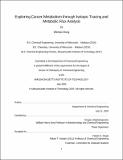| dc.contributor.advisor | Gregory Stephanopoulos. | en_US |
| dc.contributor.author | Dong, Wentao,Ph. D.Massachusetts Institute of Technology. | en_US |
| dc.contributor.other | Massachusetts Institute of Technology. Department of Chemical Engineering. | en_US |
| dc.date.accessioned | 2021-05-14T16:29:47Z | |
| dc.date.available | 2021-05-14T16:29:47Z | |
| dc.date.copyright | 2020 | en_US |
| dc.date.issued | 2020 | en_US |
| dc.identifier.uri | https://hdl.handle.net/1721.1/130611 | |
| dc.description | Thesis: Ph. D., Massachusetts Institute of Technology, Department of Chemical Engineering, September, 2020 | en_US |
| dc.description | Cataloged from the official PDF of thesis. "July 2020." | en_US |
| dc.description | Includes bibliographical references. | en_US |
| dc.description.abstract | Cancer is the second leading cause of death following heart diseases in the U.S. During the past two decades, cancer metabolism has emerged as an indispensable part of contemporary cancer research. Various types of metabolic alterations in cancer cells have been documented, prompting extensive investigation of the link between reprogrammed cell signaling pathways and rewired cellular metabolism. In addition, drug targeting of rewired metabolic pathways has been demonstrated to be a promising cancer treatment strategy. Despite this progress, a fundamental question remains unanswered: whether there is a difference in the metabolism of cancerous, fast growing cells and normal proliferative cells. This deficiency has hindered our understanding of cancer metabolism and the efforts to develop effective cancer therapies targeting metabolism with reduced side effects. | en_US |
| dc.description.abstract | In this thesis, we used ¹³C-isotope tracing and metabolic flux analysis (MFA) to study cancer metabolism and identify metabolic pathways differentially activated in cancer cells. To support efforts to design effective therapeutic therapies, we sought to distinguish metabolic behavior in cancer versus normal cells growing at the same speed, and obtain a systematic understanding of cancer metabolism. To this end, we dissected bioreaction networks in human mammary epithelial cells (HMECs) that have been genetically modified to exhibit different levels of tumorigenicity. We discovered distinct substrate utilization pattern in the tricarboxylic acid (TCA) cycle and de novo lipogenesis. Specifically, we found that glucose was catabolized in the TCA cycle up to the formation of citrate, which was then used primarily for lipogenesis. The majority of the TCA cycle flux, however, was maintained by glutamine anaplerosis. | en_US |
| dc.description.abstract | ¹³CMFA further revealed that some metabolic reactions were more activated in tumorigenic HMECs. By introducing a new quantity termed metabolic flux intensity, defined as pathway flux divided by the specific growth rate, we identified three most enhanced reactions - oxidative pentose phosphate pathway (oxPPP), malate dehydrogenase (MDH) and isocitrate dehydrogenase (IDH) in the most tumorigenic HMEC. Targeting of these three pathways with small molecule inhibitors selectively reduced growth in the cancerous HMEC line. In addition, our study provides direct evidence that metabolism may be dually controlled by proliferation and oncogenotypes. | en_US |
| dc.description.statementofresponsibility | by Wentao Dong. | en_US |
| dc.format.extent | 270 pages | en_US |
| dc.language.iso | eng | en_US |
| dc.publisher | Massachusetts Institute of Technology | en_US |
| dc.rights | MIT theses may be protected by copyright. Please reuse MIT thesis content according to the MIT Libraries Permissions Policy, which is available through the URL provided. | en_US |
| dc.rights.uri | http://dspace.mit.edu/handle/1721.1/7582 | en_US |
| dc.subject | Chemical Engineering. | en_US |
| dc.title | Exploring cancer metabolism through isotopic tracing and metabolic flux analysis | en_US |
| dc.type | Thesis | en_US |
| dc.description.degree | Ph. D. | en_US |
| dc.contributor.department | Massachusetts Institute of Technology. Department of Chemical Engineering | en_US |
| dc.identifier.oclc | 1249555585 | en_US |
| dc.description.collection | Ph.D. Massachusetts Institute of Technology, Department of Chemical Engineering | en_US |
| dspace.imported | 2021-05-14T16:29:47Z | en_US |
| mit.thesis.degree | Doctoral | en_US |
| mit.thesis.department | ChemEng | en_US |
